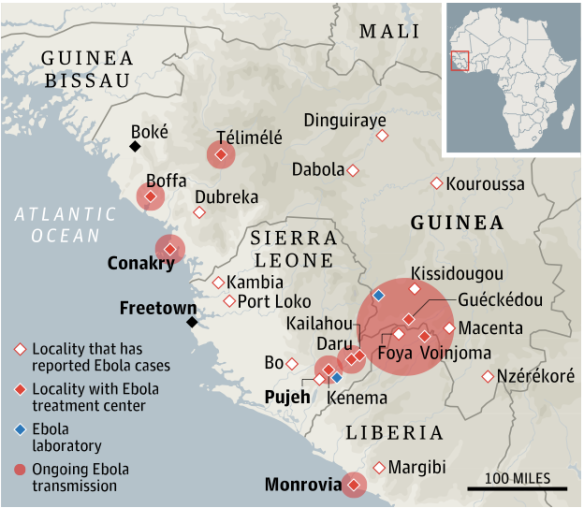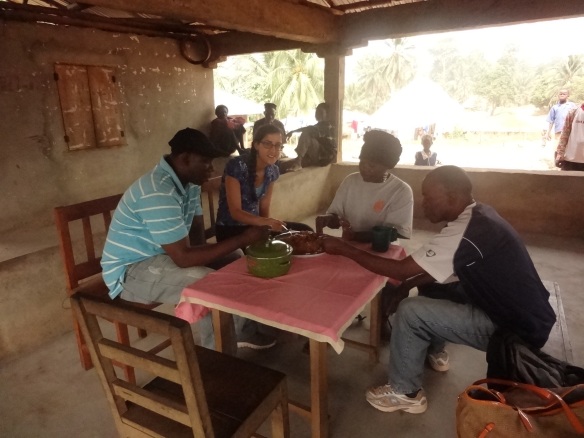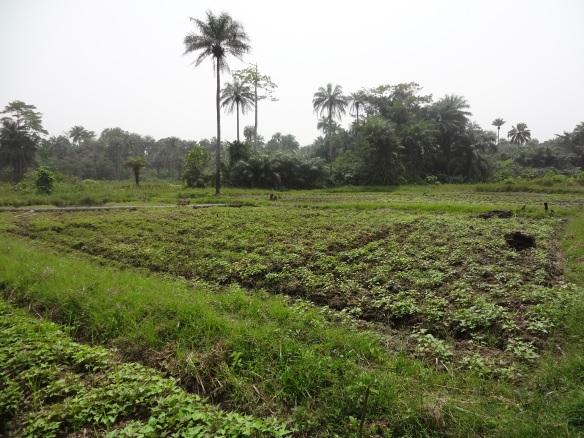Ebola – My Experience, Understandings and Recommended Next Steps
By Siera Vercillo
I have not posted in 6 months because I have been distracted and consumed by the international public health emergency of Ebola that is in West Africa. It is affecting thousands of people’s lives (some of which I know), directly impacting my work and leaving me with sleepless nights. I need to do and say something, so I am raising money to conduct awareness discussions in Pujehun, Southern, Sierra Leone and buying sanitation materials like chlorine that will be implemented by trusted religious, youth and community partners to fight the battle. Check out the fundraising campaign I started to donate here and help me with this. I am also in discussions with international and local NGOs to inform their health and safety policy & project activities.
What You Should Know In Summary
- Ebola is out of control not just because of the ignorance of local people. Simply put, it is because of poor health infrastructure, trust and denial from local governments and the international community.
- Solving the Ebola emergency requires drastic measures: quarantined areas, health screening, more training, more resources and materials, but also ‘sensitization’ or education using trusted sources: local religious and youth leaders.
- This crisis reveals people’s mistrust of the state, that’s why they do not listen to health professionals. People believe that Big Men are using the state to enrich themselves at the expense of ordinary people.
- For Canadians and others abroad a bigger concern closer to home is that some equally as infectious diseases which we once vanquished, like measles, rubella and pertussis, are now making a comeback.
My Story
When I was in Pujehun back in March I got a call at midnight by my mother anxiously yelling on the phone: Ebola is in West Africa, a country called Guinea and might have travelled to Canada. Annoyed because I needed to wake up in a few hours for farm visits, I told her that it is ok, Guinea is not Sierra Leone. But she explained and questioned: it has been around since February why isn’t anybody talking about it? Why only now when there is a suspected case in Calgary (which turned out to a bad case of malaria -god, rest the man’s soul). I searched online, I spoke to a few people from Guinea and there was very little information. I was not worried.
In April I was in a community enjoying a homemade lunch of bushmeat stew with rice after a long, typically hot morning in the garden trying to assess the potential value of peppers, eggplant and other vegetables. I then travelled back to the office where the Project Coordinator mentioned Ebola. I soon realized that no one at the office knew anything about Ebola. I quickly searched on the internet and saw the Ebola incidents were reaching historical records in Guinea with possible cases in Liberia. I had an informal staff meeting and naively announced: Ebola is coming here, we should stop eating all meat and we should be afraid. I did this because I was taught that Ebola is the type of virus that is our worst nightmare. Back home it is described as the modern day plague that has no cure, no vaccine and kills almost everyone in the most horrible kind of way- by bleeding to death. The staff I spoke to laughed at me. I realize now it was not because they thought I was being dramatic, but because they have been through this before with Lassa fever and were afraid.
Over the next few weeks I had received all sorts of information from across the continent: there was a vaccine, there was no vaccine; Ebola is air born, it is only through body contact; you can only get it from people who are dying, but also through sweat and animals. Email chains, text messages were passed around with a lot of contradictory information. Senegal and Mali closed their borders with Guinea – Sierra Leone did nothing. I contacted the Canadian Embassy that sent me the same information that was in the email chains I previously received. It was not until I heard that there were incidents on the Liberian border an hour away from where I was did I contact my Manager in Canada to inquire. I was calm, not afraid and a bit annoyed with the miss information. So I was shocked that night when I was called at 9pm from a conference call from Canada. I was trying to find a quiet enough place to speak, maneuvering in the dark as the EPL soccer game got out. I was told that the next day I was to go to Freetown and then taking the next flight home.
All I kept thinking is what do I tell the staff I am working with and friends I have made. How do I not panic them? How do I advise them? Because I have very little knowledge and information about what to do if I was in their shoes. My own family in Canada was glad I was leaving, my partner in the UK did not believe me and the family I was with was worried and confused. My coach calmed me, making me realize how stressful the situation would be if I stayed and got sick. Even something as easily curable as malaria would cause panic, as well as if the borders closed who knows what quarantine would happen if I was stuck. The next morning, I packed my things with the help of friends and explained to some staff who thought the decision to leave was drastic. But I knew (and they did to) there was information that we were not privy to because the news, government, NGOs were talking about it.
I got back to the United Kingdom in April and learnt that I was not the only one pulled out or prevented from going back to Sierra Leone. Other foreign staff from international NGOs were not sending consultants, PhD students were delaying their flights for research, local community organizations were not accepting volunteers. I knew within a week of being back home that this was the right decision. All I kept thinking is, why is this information only available once I am out of the situation? Why am I (the foreigner) the only one where precautions are made?
The outrageous thing is that in May I travelled to Canada for meetings where I am now, and was preparing to go back to Sierra Leone because the WHO deemed it all under control. Despite Doctors Without Borders calling it an outbreak. Now the WHO is calling it an international health emergency. Borders are closed, people are quarantined at airports having to go through tests, airlines have stopped flying, whole communities are locked up, project activities put on hold, even public meetings are banned. Ebola is plaguing three of the countries least equipped to cope with it. There aren’t enough clinics with resources, knowledge where tests are false positive, and rumours are going around. West African countries are watching it closely as Nigeria now has cases and I get emails about potential cases from Ghana on a weekly basis.
The outbreak started in February. It is now August. What has gone on in the past 6 months?
Power and Politics – Outbreak Could Have Been Prevented
I agree with this article: Ebola cannot be cured, but it could have been prevented. I am outraged, as should you be. This is not the result of war over land or resources – Big men fighting for power with man-made weapons. This is a virus that is killing innocent people. People like you and I with families and no idea about what to do or who to trust.
But this needs to be said: the virus has gotten out of control because of power and politics: denial from the international community and local governments. This has also led to denial from ordinary people as well. Evidence of when politics gets in the way is regarding the all of a sudden Hail Mary of a cure coming from the USA. As a Nigerian-Canadian friend on facebook rightfully stated: “So this experimental serum helped the American doctor. Great! BUT HOW COME NO ONE MENTIONED THE SERUM WHEN AFRICANS WERE DYING? Sigh”. Me also insisting with organizations that there are cases in Pujehun and that it would be naive to think otherwise when there are cases an hour away. But until there is ‘proof’ there are no actions taken, which is why the outbreak has turned into an emergency. Thankfully I did what I could and stopped all the activities I am responsible for. But it is not good enough.
As said here, although we should not just blame government or international communities because curbing the spread of Ebola does not happen overnight, what has been done has not been working and public services are still poorly equipped. This is because of the many actors involved in the Ebola response has complicated the response, especially since it’s unclear who is in charge.
Unfair Cause of the Outbreak – It’s not just the ignorance of people
Fear and ignorance are increasingly said to be playing a role in the spreading of the virus, which is unfair. The news coverage I have heard on the BBC, CNN etc. focuses on how dangerous it is for local people not to comply. Local practices such as the consumption of bushmeat (like the meal I was eating earlier) and traditional funeral practices are the go-to explanations for Ebola’s outbreak. However, decades of anthropological research indicates: “not only that this picture is an over-simplification, but that disease control policies based on these ideas may be unhelpful”. Yes, part of the problem is that heath officials have been attacked, rumors that the disease does not exist, belief that people who go to the hospital will not come out alive is resulting in more and more Ebola cases. People are going ‘missing’ or families are taking them out of hospital is not helping.
This is explained better here by Susan Shepler “When someone has the symptoms—fever, vomiting, diarrhea—they are supposed to report to the health center, where they will be taken away from family, and if they die, be buried by men in protective gear with no family present. You can see why people might be loath to turn over their loved ones. Really who among us would want to turn a sick loved one over to a hospital staffed with foreigners, knowing we might never see them again? … People’s apprehensions about the failings of the healthcare system come from experience, not from ignorance.” This crisis reveals people’s mistrust of the state. That is why communities are taking sick people out of hospitals and keeping them at home. This is understandable in the aftermath of war, but also people believe that the state is actually out to get them or that Big Men are using this to enrich themselves at the expense of ordinary people.
We need to understand history from an anthropological perspective and use local knowledge to tackle the problem. For example, Lassa fever, another viral haemorrhagic disease is relevant, with longstanding rumours about medical staff administering lethal injections and people avoiding the hospital in Kenema, Sierra Leone where Ebola is treated is something that should have be recognized.
In Mende areas where I was living, there are general categories of big and small fever, and ordinary and hospital sick. Diseases can be understood as caused by multiple things, including ‘witchcraft’. The importance of burial practices cannot be underestimated as they are strictly controlled by the male and female societies. Key to understanding health provision is to “understand how disease categories shift as the illness progresses.”
Our Perspective from Abroad
We also need to remember that Ebola is not the exception as outlined here, but one example of the terrible norm – where thousands of men, women and children are dying from a range of horrible diseases every day. Dengue, measles (spread through air-droplets) and hepatitis B (spread like HIV but 50 times more infectious). There is no cure for rabies either with an equally as slow and painful death as Ebola.
In reality, the news likes to create a stir of fear for gaining more viewers, which results in unwarranted panic. A bigger concern closer to home is that some diseases which we once vanquished, like measles, rubella and pertussis, are now making a comeback.
More Reading
Most heartfelt story from the front lines here – Trigger Warning- it is a bit gross but reflective of how strong ordinary people can be.
Voices from the heroic people – health care professionals working on the front line here.
How Ebola spread outlined here







